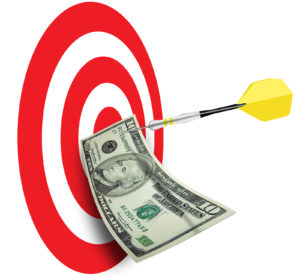Do you want to maximise your sales? Fantastic! As you know, in order to do that you need to understand your customer. Who are you selling to? Why should they buy your services in the first place? What is their main takeaway? What do you say?
1. You’re here to solve a problem, mate

The starting point in defining the target market for your proposition is to understand the problems that you solve. Once you have a good idea what these are, you can start to work out who is most likely to suffer from these problems.
2. Describe your customer in detail
Start to list all the different types of customers that suffer from the problems you solve. Once done, you can start to build up a picture of these customers. Group them by location – for example, high net worth individuals tend to live in certain postcodes. Group them by market sector – are they manufacturers, recruitment agents, and so on.
Ask yourself other types of relevant questions about these people. Are they married? Are they male or female? Do they play golf? Define them in as many relevant ways as possible.
3. Who can benefit the most from your offer?
Ask yourself:
To whom will these problems be most troublesome?
Who will have the most to lose by not dealing with these issues?
If you can demonstrate that the cost of not sorting out the problems is greater than the cost of dealing with them, then your case becomes compelling. Remember to take into account aspects like emotional upheaval, stress and the risk to reputation when implementing your solution, as well as a bottom line cost. It is all these factors that make up the value in your offering.
4. Think about your market
 Today we live in the world of niche. For example, we are no longer prisoners of television schedules. We can watch what we want at our convenience from almost anywhere in the world; meaning every person can enjoy a unique viewing experience.
Today we live in the world of niche. For example, we are no longer prisoners of television schedules. We can watch what we want at our convenience from almost anywhere in the world; meaning every person can enjoy a unique viewing experience.
The web is fantastic at delivering personalised products and services, cutting out many of the distribution challenges that previously existed.
It is these factors that mean it is a more effective strategy to be a big fish in a small pond rather than the other way round. It will be easier to build your reputation and gain referrals. You will also find you get more from your marketing endeavours.
Therefore, with the previous knowledge gained, start to segment your market.
Do you want to work:
- with particular types of people – high net worth individuals, men, women, business owners, and so on?
- in certain geographical locations – Liverpool, Alicante, Granada, Loussiana, Worcester, and so on?
- around tight market sectors – manufacturers or accountants, and so on?
5. Look internally at your company
One way of deciding on the right markets to pursue is to think about your company and your business.
- Do you have particular areas of expertise? For example, do you have a lot of experience in particular markets, such as working with lawyers?
- Do you have unique knowledge of a specific geographical area?
- Are you better at getting on with certain types of people?

All these factors could help you establish a particularly attractive offering. Take an accountant working alone in Valencia, for example. For a start, working all over the country is probably not practical. They may therefore decide to only work with clients in the Valencia and North of Alicante area. It may be that before going it alone they worked in-house for a couple of different entrepreneurial businesses. Therefore, the accountant may decide to make their marketplace ‘Entrepreneurs in the Valencia and North of Alicante area’.
Suddenly, if you are an entrepreneur in the Valencia region, this is an accountant probably worth knowing. By solely working in this area they are more likely to introduce you to the right people and have more market knowledge of schemes and funding available to entrepreneurs.
Meanwhile, by concentrating in this marketplace, the accountant knows which websites to look at and belong to, which publications to read and possibly write for, and which networks to attend. Within this market it will be quite easy for the accountant to become known. Without limiting their market it would almost be impossible to know where to start.
6. What do I have to compete with?
Once you have decided the answers to some of these questions you must look at the market to see what else is available. The question you must have an answer to is:
Why am I uniquely placed to solve the problem?
It may be that for some marketplaces there is no answer. However, in certain sectors or geographical locations there may be a compelling response to that question. If you are unable to answer the question, you either have the wrong target market or the wrong offering. In this case, more work will need to be done before you start targeting your potential customers.

